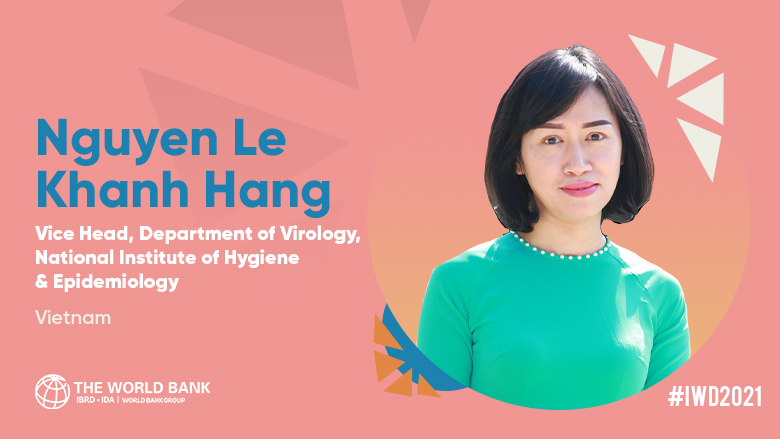Perseverance Is Key To Success, Viet Nam's Top Virologis Says
VGP - Interviewed by the World Bank, Nguyen Le Khanh Hang, Viet Nam's leading virologist, expressed her belief that perseverance is key to success because whether it's in laboratories or life, one has to go through countless trials to get to the desired outcomes.
 |
The following is the full interview:
For International Women’s Day 2021, we’re sitting down with women across East Asia and the Pacific who are taking on leadership roles and working towards an equal future in a COVID-19 world. Nguyen Le Khanh Hang is Viet Nam’s leading virologist whose research has informed the country’s strategies to manage outbreaks of infectious diseases. She believes that perseverance is key to success because whether it's in laboratories or life, one has to go through countless trials to get to the desired outcomes.
Could you share with us how did you become a virologist?
Since I was a student, I was fascinated with the complexity of viruses and how such microbes could afflict human beings to a great extent. Right after graduation, I landed a job at the National Institute of Hygiene and Epidemiology. I could not think of a better place to start and build a career because this is a major center for research in Viet Nam and I had a chance to work with all the leading experts who generously shared their knowledge and encouraged me to maintain that passion.
During the past two decades, I was part of Viet Nam’s core expert team that studied many highly contagious viruses. I noticed that public interest in the field of epidemiology has been rising since the outbreak of SARS in 2003. With SARS then and COVID-19 now, we have witnessed the emergence of highly contagious pathogens which could spread so rapidly due to unprecedented advances in human mobility. Our field has become more important since we provide critical evidence to guide countries in their efforts to prevent, detect and mitigate health threats.
How was your work impacted by the COVID-19 pandemic?
Our workload has been absolutely immense, but we understand that our work has become more important than ever. Since the first official COVID-19 case was detected in Viet Nam on January 23, 2020, we raced against time to get some understanding of what was then dubbed as a “mysterious virus”. By February 2020, Viet Nam became the fourth country in the world to successfully isolate the novel coronavirus from patient specimens. Getting a better understanding of the virus’s behavior and potential threats laid a strong foundation for the development and assessment of diagnostic testing kits and vaccines afterward.
In addition to research and analysis, we did a lot of training to ramp up testing capacity nation-wide. In the beginning the turnaround time could be up to 24-48 hours. With support from the World Bank, we provided training in diagnostic testing to 600 lab staff. Now, 94 laboratories nation-wide are capable of COVID-19 testing. The average turnaround time has been cut dramatically to 4-6 hours.
I am so proud that our foundation work has enabled Viet Nam to run widespread local testing. Vietnam performs more tests per confirmed case than any other countries in the world – which contributes to the country’s effective containment of the virus.
The COVID-19 pandemic has presented incredible challenges to all frontline workers. What kind of challenges particularly female health experts and staff have to overcome?
The COVID-19 pandemic has placed health workers, especially those working on the frontline, under extraordinary and unprecedented pressure. Not only the workload increases tremendously but so does the level of exposure to risks. The mandatory quarantines due to working closely with COVID-19 patients means long episodes of separation from loved ones. This causes huge disruption for female workers who, on top of their extremely hectic work schedules, often assume the role of primary caregivers in their families.
This year's theme is 'Women in Leadership' - is there a female leader that inspires you? Why do they inspire you?
I am fortunate to work at an institution whose legacy has the footprints of many talented women. The one figure I look up to is our Vice Director Prof. Le Thi Quynh Mai. She is an exemplar of what I call “quiet warriors” whose determination, dedication to greater public good and hard work inspires me every day.
Do you have any advices for young women in Viet Nam who want to make an impact on society?
To succeed, you need a clear purpose and strong passion to drive you forward, especially if you choose to build a career in lesser-known fields. And needless to say, perseverance. Whether in a laboratory setting or life, we have to go through countless trials to get to the desired outcomes. You just don’t give up.
What are your hopes and plans for the future?
My hope is to see more progress in the field of epidemiology and preventive medicine in Viet Nam. We aim to have more of our scientific research to be published in top journals and conduct studies of regional and international scopes. Knowledge sharing and international cooperation are more critical than ever to fight contagious diseases in a highly connected world.
Over the past 15 years, we have gained tremendous experiences from dealing with different pandemics such as SARS-2003 and now COVID-19. But we have to strengthen our capacities even more and in a systematic way. It will require significant investment in physical infrastructure and human resources. I am glad to see in addition to the State budget, the private sector has become more interested in funding research and development in biosecurity products.
We look forward to fostering partnerships with the private sector as well as international research institutions to get a better understanding of the world of viruses and thus better prepare us against future outbreaks.
Source: World Bank

